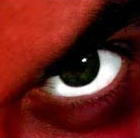Ganesha II – Aaron’s
Childhood Vision
By James Donahue
February 2005
There is a personal angle
to the story of Ganesha, the strange Hindu elephant-faced deity of India..
When he was a child of
six years, our son Aaron C. Donahue astounded educators in the Kalamazoo
public schools. While they watched, he produced a clay figure of a blue elephant that he identified as “GAN.”
Donahue looks back on
that experience as a moment when he appears to have drawn from the collective, using natural psychic and remote viewing abilities,
to produce information that a six-year-old child in America
should not have known.
He said he remembers
that several adults were visiting the classroom that day. He believes they were testing various children for admission to
a special program being developed for gifted children. Aaron was among the children selected for the program.
“They gave me a
lump of clay and asked me to make something,” Donahue recalls. He said the adults stood back and watched, trying not
to be too conspicuous, as he quickly molded the shape of an elephant. On the animal’s belly he wrote the letters “GAN.”
He had the figure completed
within about a minute, he said.
When he was finished,
his teacher and the other adults in the room gathered around him to examine his creation. “And what is this?”
someone asked.
“It is an elephant,”
Aaron announced.
“And what color
do you want to paint it?” he was asked.
“Blue,” said
Aaron.
“Blue?” his
instructor asked. “Why would you paint an elephant blue?”
“Because it is
blue,” answered Aaron. “Other elephants aren’t blue, but this one is blue.”
When the clay figure
was examined, jaws opened when the letters on the bottom were discovered. Someone in the room knew the story of Ganesha.
Donahue said the strange
Indian deity is the local concept of a midwayer, powerful beings that exist in a spiritual plane on the Earth.
He believes the mystics
of India were capable of seeing midwayers
and attempted to draw what they saw. Their drawings looked somewhat like the face of an elephant on a human body with several
arms, because that is the best way they could define what they were seeing.
While few Indian drawings
show a blue image, many have a blue background. Donahue said that when he sees a midwayer, he also sees a bluish hue that
emanates from around them.
Many ancient Egyptian
artists also pictured midwayers in their drawings.
Little is known about
midwayers, except that they are few in number and they seem to be very powerful beings that live outside of the awareness
of most humans. They are charged with electrical energies.
Donahue said there is
a collective unconscious memory of the midwayers because they once existed with humans in the garden. But they are mostly
gone now. Only four living midwayers still exist on the planet and one of these remains in a dorment state.
The three active entities
guard the gates of paradise. Thus they are the gatekeepers of Eden.
When the fourth midwayer
awakens, he will bring a fearful judgment upon mankind, Donahue warns. This judgment will come in the form of plagues, increased
aging and a general sadness that will sweep all of mankind.
Thus it appears that
the Hindu mystics chose the midwayer as one of their many gods.
For another look at midwayers,
go to Donahue's website at http://ummo.cc/DHSoul.html. All three midwayers are shown fleeing the planet, foreground, at the moment of its death. The remote viewing session that
produced the drawing examined the target: Death of the Human Soul.
When the planet dies,
the midwayers also perish.

